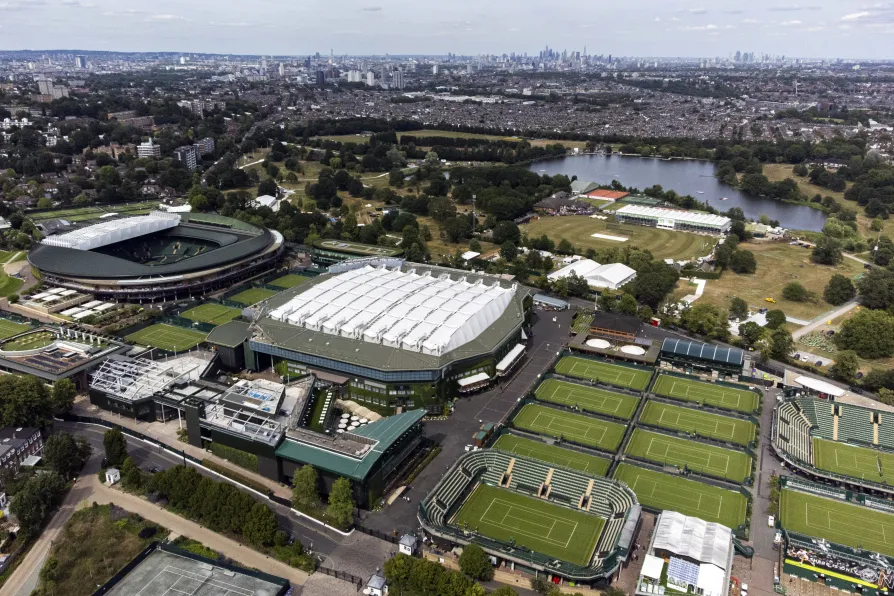Campaign group’s legal challenge against decision to approve proposals dismissed

 A general view overlooking the All England Lawn Tennis and Croquet Club
A general view overlooking the All England Lawn Tennis and Croquet Club
PLANS to almost triple the size of the Wimbledon site are set to proceed after a campaign group’s legal challenge against the decision to approve the proposals was dismissed by a High Court judge today.
Save Wimbledon Park (SWP) took legal action against the Greater London Authority’s (GLA) decision to grant planning permission last year.
The proposals, submitted by the All England Club, would see the construction of 38 new tennis courts and an 8,000-seat stadium on the grounds of the former Wimbledon Park Golf Club, allowing it to host Wimbledon qualifiers on-site.
Barristers for SWP told the High Court earlier this month that the decision to approve the plans was “irrational” and should be quashed, as Wimbledon Park — a Grade II*-listed heritage site partly designed by Lancelot “Capability” Brown — was covered by restrictions on how it could be used.
The GLA and the All England Club defended the challenge, with the court told that the decision was a “planning judgment properly exercised” and that the restrictions were not “material.”
In a ruling yesterday, Mr Justice Saini dismissed the challenge.
He said: “In short, the defendant’s decision on the relevance of deliverability, applying to both the statutory trust and the restrictive covenants, was a planning judgment rationally exercised and having regard to appropriate and relevant factors.”
Following the ruling, SWP said it has been “advised that it should” seek to challenge the decision, and that it believed the GLA “did make a significant legal error in the way it dealt with the special legal status of the park.”
The proposals would see seven maintenance buildings, access points and an area of parkland with permissive public access constructed, in addition to the courts and associated infrastructure.
They would also include work on Wimbledon Lake.
After Merton Council approved the plans, but Wandsworth Council rejected them, the Mayor of London’s office took charge of the application but Mayor Sir Sadiq Khan recused himself from the process after previously expressing public support for the development.
Planning permission for the scheme was granted by Jules Pipe, London’s deputy mayor for planning, who said that the proposals “would facilitate very significant benefits” which “clearly outweigh the harm.”
Debbie Jevans, chair of the All England Club, said at the time that the proposals would deliver 27 acres of “newly accessible parkland for the community.”
In written submissions, Sasha White KC said that the All England Club acquired the freehold for the golf course in 1993 and the leasehold in 2021.
The barrister told the two-day hearing in London that the land was subject to a “statutory trust requiring it to be kept available for public recreation use” and that when the freehold was acquired, the club entered into “restrictive covenants” governing its use.
He said this meant any plans could not “restrict its use so as not to impair the appreciation of the general public of the extent or openness of the golf course land.”
He continued that separate High Court proceedings were ongoing over whether a statutory trust existed, and that if it does, the All England Club has “accepted” that this is “incompatible with the development of the proposal.”
A hearing in that case is due to take place in January 2026.
In court, he said: “You could not have a more protected piece of land within the planning system, frankly.”
Christopher Coombe, director of SWP, said following the judgment: “This judgment would, if it stands, set a worrying precedent for the unwanted development of protected green belt and public open spaces around London and across the country.
“The [All England Club] will surely have noted the considerable public outrage about this development, most recently expressed outside the law courts, and we continue to hope that they could be persuaded to engage constructively with us, with a view to achieving a resolution of this four-year-old dispute.”
Sir Sadiq said: “This is welcome news that will cement Wimbledon’s reputation as the greatest tennis competition in the world and London as the sporting capital of the world.
“This scheme will bring a significant range of economic, social, cultural and environmental benefits to the local area, the wider capital and the UK economy, creating new jobs and green spaces.”














